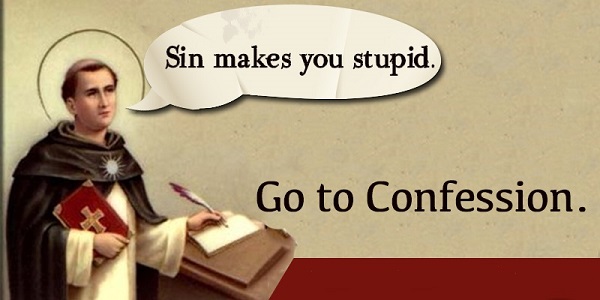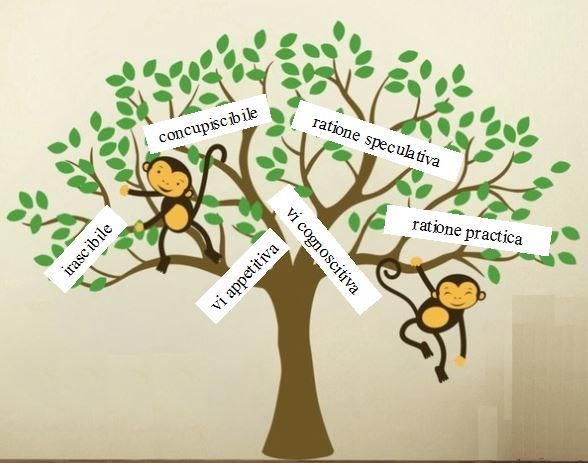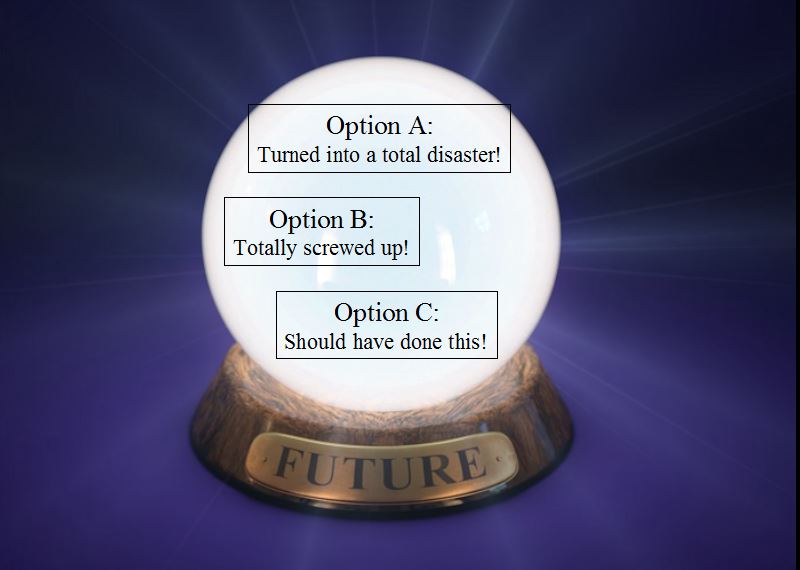
The Three Acts of Prudence (or "Goalance"): Deliberating, Judging, Commanding.
Let's Adore Jesus-Eucharist! | Home >> Philosophy

The Three Acts of Prudence (or "Goalance"): Deliberating, Judging, Commanding.
"What the heck am I supposed to do with my life?"
I don't know about you, but that question continues to haunt me. What does God want me to do? What is the goal I must attain, and what are the means I must choose to reach that goal?
Of course my ultimate goal is to do good and avoid evil; of course I must strive to become a saint; of course my goal is to go to Heaven to be perfectly happy, but that ultimate Goal is too vague. Here, I'm talking about "intermediate" goals. What should I study? What job should I try to obtain, or keep? Should I marry or not? Where should I live? How should I pay my bills? And those are the "easy" questions! It get's worse! My neighbor and best friend has a mortal disease, how do I take care of her? My Country is circling the drain, how do I pull it away from the brink? And even my Church is falling apart, so what do I do?
As you can see, I'm not talking about an inanimate heap of questions here, I'm talking about an angry swarm of stinging questions that chases me around almost relentlessly.
Saint Thomas Aquinas would probably have answered by talking about virtues, especially the cardinal virtue of Prudence. (I find it helpful to silently call it "Goalance", since Prudence orders the appropriate Means to reach our Goal.) Some quotes:
Prudence is of good counsel about matters regarding man's entire life, and the
goal of human life.
[Summa Theologiae,
Ia-IIae, q. 57, a. 4, ad 3]
prudence is more excellent than the moral virtues, and moves them
[Summa Theologiae,
IIa-IIae, q. 47, a. 6, ad 3]
whoever sins, acts against right reason, i.e. against prudence
[Summa Theologiae,
IIa-IIae, q. 53, a. 2, arg. 1]

Sin makes it hard to understand something like Prudence.
[Summa Theologiae,
IIa-IIae, q. 53, a. 6, co.]
I often begin my articles with a "methodological note", like a scientist who, before talking about everything he's just discovered with his microscope, will remind readers about the limits of his instrument (for example, he cannot see objects smaller than this or that, he cannot see through opaque objects, some objects are denatured instantly by the light he has to shine through the sample, etc.).
This is particularly true for an article on "Goalance" or Prudence. First of all, if I had this wonderful virtue, my life would be well-organized, and I would have solved my problems and the problems of the people around me! Secondly, as Saint Thomas explains, sin makes you stupid, so since I'm such a sinner, I'm not very good at understanding complicated things like "Goalance" or Prudence.
The third reason is that Saint Thomas Aquinas provides only a brief overview of the virtue of Prudence. Imagine you wanted to become a good ice hockey player, and you asked Saint Thomas what to do. He would probably answer with something like: "You must acquire the virtue of shooting the puck in the net, and the virtue of making passes to the right players at the right time, and the virtue of skating fast", etc. All of this is true, but none of this makes you a hockey star. Lining up and labeling "knowledge buckets" or "shoeboxes to classify what we know" is not the same as actually having the contents of those buckets and shoeboxes. (But it does help: we can see what we're missing, and we know were to put it when we find it.)

[Source]
If you're not used to it, reading Saint Thomas feels like being lost in a forest. But often Aquinas is just climbing a tree, a "Porphyrian Tree", which is a way to organize knowledge so everything is neat and tidy. (Saint Thomas Aquinas is a neat freak, so he likes starting at the beginning, and putting everything in its place.)
To the question: "What is Prudence?", Aquinas the monkey might climb thusly:
Is it a substance, or not? (Reminder: Being is divided into Substance (e.g. man, dog, rock, etc.), or Accidents.) It's not. So it's an accident. Now, is it a quality, or not? (Reminder: Accidents are quantity, quality, relation, location, time, etc.) It is. So it's a quality. Now, is it a stable disposition of some power, or not? (Reminder: Quality is divided into "figure" (like geometric shapes), "habitus" or stable dispositions of some power, etc.) It is. So it's a "habitus". Now, is it a stable disposition that makes this power do bad things? (Reminder: vice!) It isn't. So it's a virtue. Now is this a virtue of the appetitive power, or not? (Reminder: we have "powers" or "faculties" of reason and will, also known as intellective and appetitive powers.) It's not. So it's a intellective virtue. Now, is it speculative, or not? (Reminder: we can use our reason to seek knowledge, or for the sake of getting something done.) It's not. So it's a virtue of the practical intellect. Now, is it art, or not? (Reminder: "Getting something done" means the right ordering of means to reach a goal. "Art" in latin includes both fine arts which aim at "manufacturing" beauty, as well as what we would call "engineering" today, or "mechanical arts", like building bridges, houses, cars, etc. Art is "recta ratio factibilium", or the right reason of "makeable things", and is opposed to "recta ratio agibilium", or the right reason of "behaviorable" things.) It's not. So Prudence or "Goalance" is a good stable disposition of the practical intellect that orders behaviors to reach the goal.
At that point in the "tree", it's logical to ask ourselves: "Does Goalance decide what the goal is?".

[Source]
Contrary to what Dogbert says, we are not "organic pain-collectors racing toward oblivion", but organic God-seekers, able to race toward eternal happiness in Heaven. Because we are endowed with intelligence and free-will, and because we are not presently in possession of the Ultimate Goal (also known as "The Absolute Good", or "The Supreme Being", or "God"), we must freely chose the right behaviors that will lead us to Happiness, our Ultimate Goal.
it does not belong to prudence to appoint the end to moral virtues, but only to
regulate the means.
[Summa Theologiae,
IIa-IIae, q. 47, a. 6, co.]
the commandments of the decalogue [... come] under the purview of natural reason. Now
foremost among the things dictated by natural reason are the ends of human life [...].
Now prudence is not about the end, but about the means
[Summa Theologiae,
IIa-IIae, q. 56, a. 1, co.]
We can now consider the actual nature of Prudence or "Goalance". First, it determines "the golden middle" of the other moral virtues. What is this "golden middle"? Simply the ordering of means that will allow attaining the end:
For though the attainment of the [golden middle] is the end of a moral virtue, yet this
[golden middle] is found by the right disposition of these things that are directed to
the end.
[Summa Theologiae,
IIa-IIae, q. 47, a. 7, co.]
Next, Prudence has three acts (see image at the top of this web page), which today we might call: research on available options, selection of the best course of action, and implementation:
Now there are three such acts. The first is "to take counsel", which belongs to
discovery, for counsel is an act of inquiry [...]. The second act is "to judge
of what one has discovered" and this is an act of the speculative reason. But
the practical reason, which is directed to action, goes further, and its third
act is "to command", which act consists in applying to action the things
counselled and judged.
[Summa Theologiae,
IIa-IIae, q. 47, a. 8, co.]
Prudence keeps us in a state of vigilance, so we can detect opportunities to get closer to our goal, and pounce on them [IIa-IIae, q. 47, a. 9, co.]. This unfortunately implies some lack of peace and quiet in our lives [IIa-IIae, q. 47, a. 9, ad. 2], so Prudence can never totally eliminate the "angry swarm" mentioned in the Introduction.
Because the Common Good of all men is better than our own personal good, Prudence strictly speaking first aims for the Common Good:
He that seeks the good of the many, seeks in consequence his own good, for two reasons.
First, because the individual good is impossible without the common good of the family,
State, or Kingdom. [...] Secondly, because, since man is a part of the home and State,
he must needs consider what is good for him by being prudent about the good of the
many. For the good disposition of parts depends on their relation to the whole
[Summa Theologiae,
IIa-IIae, q. 47, a. 10, ad. 2]
I remember an old Logic professor at the Laval University Philosophy Department, who would say the standard order of questions for a new Science was: "An sit, quid sit, quot et quae partes". First, does the thing we are studying exist? ("An sit" in Latin) If so, what the blinkedy-blink is it? ("Quid sit") Then, how many parts does it have, and what are they ("Quot et quae partes"). Predictably, Saint Thomas Aquinas at this point starts talking about the parts of Prudence.
Traditionally, three kinds of parts are distinguished: integral, subjective and potential. These days, programmers might describe the first two as "has-a" and "is-a". For example, a vehicle "has-a" motor, "has-a" a chassis, "has-a" transmission, etc. (i.e. "integral" parts). For "subjective" parts of "mammal", we could say a zebra "is-a" mammal, a dog "is-a" mammal, a squirrel "is-a" mammal, etc. I'm not sure I understand "potential" parts; to me, they seem to be "anything that is not integral or subjective, but that are related so much that we can't honestly call them parts of something else"! To make things more complicated, Aquinas talks about "quasi-integral" and "quasi-potential" parts of Prudence. I need some Aspirin. To make my life easier, I'll dispose of subjective and potential parts first.
Subjective parts
Prudence has subjective parts because of the nature of the Common Good (social) and who must collaborate to attain it (individuals). So Prudence can either be for all men ("regnative/political" Prudence), or for one man ("monastic" Prudence) or for some intermediate social group ("economic" Prudence, normally for the family, but even though Aquinas doesn't say this, I guess he might also consider "economic Prudence" a catch-all for the other intermediate social groups) [IIa-IIae, q. 47, a. 11, co.]. Aquinas adds another kind, "military" Prudence, which seems a bit strange, until you think about my questions in the Introduction ("My Country is under attack, what do I do?" and "My Church is under attack too"):
Now nature has a twofold tendency: first, to govern each thing in itself, secondly, to
withstand outward assailants and corruptives: and for this reason she has provided
animals not only with the concupiscible faculty, whereby they are moved to that which
is conducive to their well-being, but also with the irascible power, whereby the animal
withstands an assailant. Therefore in those things also which are in accordance with
reason, there should be not only "political" prudence, which disposes in a suitable
manner such things as belong to the common good, but also a "military" prudence,
whereby hostile attacks are repelled.
[Summa Theologiae,
IIa-IIae, q. 50, a. 4, co.]
Quasi-potential parts
I don't get them yet [Summa Theologiae, IIa-IIae, q. 51, pr.] To me, they just seem like thing-a-ma-bobs that help two of the aforementioned three acts of Prudence. "Eubulia" helps counsel, and "synesis" and "gnome" help judgment (with "gnome" being some kind of "super-synesis"). Sorry. Did I mention sin makes me stupid?

[Source]
What "integral parts" must we assemble to obtain Prudence? Aquinas names eight, the first and most important being "foresight". That seems obvious: if we could see into the future, it would be so easy to chose the correct path to reach our goal! We would be able to see which paths are dead-ends, which paths lead to disaster, which paths barely work even with huge efforts and tons of money, and which is the right path leading to a quick and easy victory!
foresight is the principal of all the parts of prudence, since whatever else is
required for prudence, is necessary precisely that some particular thing may be
rightly directed to its end.
[Summa Theologiae,
IIa-IIae, q. 49, a. 6, ad 1]
to obtain knowledge of the future from knowledge of the present or past,
[...] pertains to prudence
[Summa Theologiae,
IIa-IIae, q. 47, a. 1, co.]
As far as I can see, all the other parts of Prudence are there for the sake of foresight. So, how can we predict the future? How can we look at a given goal, see the situation we are in, and somehow "fore-see", see ahead of time what will happen if we do this or that? I wish I knew! Aquinas might say foresight requires:
- Knowledge of universal principles (i.e. general rules describing how reality reacts when you do this or that). This in turn requires: - First, a clear vision of the "starting points" of your thought process ["intellectus", IIa-IIae, q. 49, a. 2, co.] - Then, good thinking based on those "starting points", i.e. going from known to unknown ["ratio", IIa-IIae, q. 49, a. 5, co.] - helped by yourself ["sollertia", IIa-IIae, q. 49, a. 4, co.] - helped by others ["docility", IIa-IIae, q. 49, a. 3, co.] - helped by the School of Hard Knocks ["memory", IIa-IIae, q. 49, a. 1, co.] - Then, these universal principles must be applied to your particuliar situation. So you must be able to detect: - Circumstances which would transform normally successful actions into failures ["circumspection", IIa-IIae, q. 49, a. 7, co.] - Bad people, or places, etc., that appear good, i.e. pitfalls ["caution", IIa-IIae, q. 49, a. 8, co.]
After the parts of Prudence, Saint Thomas Aquinas describes many vices contrary to the virtue of Prudence, some directly opposed [Questions 53-54], some "opposed" by being false imitations [Question 55]. He concludes with the "precepts" related to Prudence [Question 56], another section I didn't understand well.

[Source]
If you find this article too long to read, Aquinas might say: "At least remember the Beatitude corresponding to Prudence":
"Blessed are the merciful"
[IIa-IIae,
q. 52, a. 4, co.]
Indeed, what is the shortcut to reach THE goal (i.e. Heaven)? Works of Mercy! Mercy is an effect of Charity, and "love moves to acts of Prudence" [IIa-IIae, q. 47, a. 1, ad 1]. There are seven works of corporeal Mercy, and seven works of spiritual Mercy (the Bible are often summarizes them as just "eleemosyna" or "almsgiving"):
visito, poto, cibo, redimo, tego, colligo, condo to visit the sick, («visito» = I visit) to give drink to the thirsty, («poto» = I give to drink) to feed the hungry, («cibo» = I feed) to ransom the captive, («redimo» = I redeem) to clothe the naked, («tego» = I cover) to harbor the harborless, («colligo» = I gather) to bury the dead («condo» = I bury) consule, castiga, solare, remitte, fer, ora to counsel the doubtful, which includes "to instruct the ignorant", («consule» = give counsel!) to reprove the sinner, («castiga» = chastise!) to comfort the sorrowful, («solare» = give solace!) to forgive injuries, («remitte» = forgive!) to bear with those who trouble and annoy us, («fer» = bear!) and to pray for all («ora» = pray!)
Let's Adore Jesus-Eucharist! | Home >> Philosophy